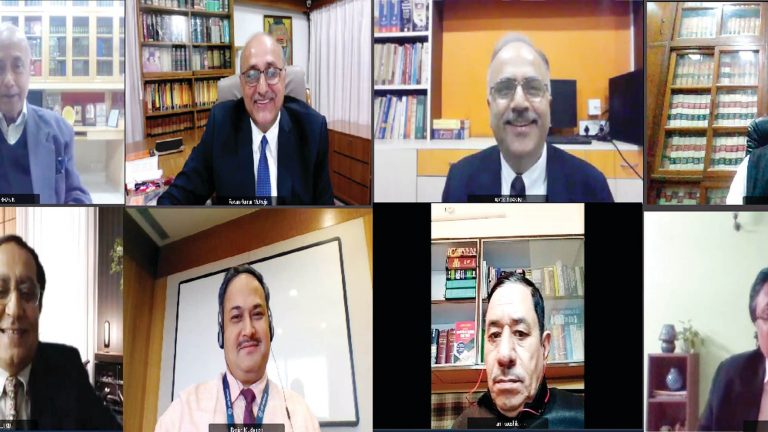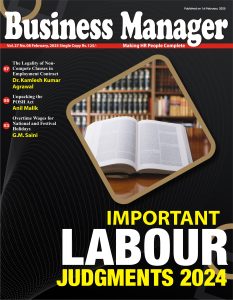Confederation of Indian Industry (CII) organized a Panel Discussion on Labour Law Reforms on 02.12.2021, from 4pm to 5.30 pm, over virtual platform. This was the tenth session as part of “Legal Services Month” organized by CII in November- December 2021.
Delivering the welcome remarks, Dr. Lalit Bhasin, Chairman, CII Task Force on Legal Services and Managing Partner, Bhasin & Co. & President, SILF, highlighted the significant role played by the judiciary over the years in the development of labour laws in India, including, but not limited to, laying down interpretation of the terms “industry” & “workman” in the Industrial Disputes Act, 1947, distinction between a “workman” and a ‘non-workman’, role of ‘collective bargaining’, powers of the Industrial Tribunals and Labour Courts, etc.
Mr. Alok Bhasin, Chairman, CII Sub-Committee on Labour Law Reforms and Advocate, Bhasin & Bhasin Associates, stated that passing of any labour law reforms leads to controversy; obviously, due to seemingly irreconcilable interests of the social partners, i.e., employers and employees. He further stated that in view of the partly federal nature of our Constitution and “labour” being in the Concurrent List, there is bound to be a variety of labour laws. In some cases, there could even be some conflict between the labour laws passed by the Parliament and the State legislatures. As per him, there is a broad consensus that the labour laws in India are too many and, sometimes, too complicated and, therefore, need to be simplified and rationalized, which was also emphasized by the Second National Commission on Labour. Having reviewed the entire gamut of labour laws, the Commission recommended, inter alia, that the labour laws be grouped into well-recognized functional groups relating to “industrial relations”, “wages”, “social security”, “safety” and “welfare”. Mr. Alok Bhasin elaborated that there are more than 40 central and 100 state labour laws in India, which reflect on the magnitude of compliances to be made by the employers. At present, 29 central enactments have been sought to be consolidated/amalgamated and rationalized in the four labour codes. He noted that demands have been made from time to time to deregulate the labour laws and confer on the employers unbridled right to “hire and fire” as well as absolute freedom to employ workers on fixed term contracts as against permanent contracts. However, such demands have been stiffly opposed by the trade unions and some sections of the social media, which feel that the Indian labour laws are flexible enough to enable the employers to run their establishments in a viable manner. He stated that the focus of the panel discussion was to determine whether certain new provisions in the four labour codes stand the test of clarity and the purpose of enactment of labour codes. While analysing the definition of wages in the four labour codes, he remarked that the definition is too cumbersome and complicated and leads to lot of ambiguities.
Mr. Pawan Kumar Mutneja, Senior Advocate, Punjab & Haryana High Court, talking about the concerns regarding interpretation and implementation of the new definition of “wages”, stated that the companies will need to review the wage structures and their financial implications, otherwise the burden will be very huge for all industries due to the compounding effect on wages that will take place. He stated that the existing processes of pay rolling will not work, as provident fund and bonus will be very difficult to compute with certainty. There will be increase in Provident fund liabilities. Further, employees exempted from bonus will need to be included in case their wages would be varied by the present definition and, hence, bonus-net will need to be widened. The overtime calculations will become most difficult, as it will present a complex problem, and also have a compounding effect. Besides, with the rise in current wages, the rise in the payment of gratuity will be phenomenal, and leave encashment will be payable on higher wages. Therefore, the wage structures will need a complete reorganization.
Mr. Saurabh Prakash, Advocate, High Court of Delhi, observed that the new labour codes have introduced many variables, which may cause complications, for instance, under the Industrial Relations Code, in the definition of “fixed term employment”, the phrase “all statutory benefits available to a permanent worker” (payable on termination of fixed term employment) may lead to conflicting interpretations. Further, he raised a question as to whether repeated fixed term employments of a worker, for a number of years, will constitute an “unfair labour practice”, since the term “fixed term employment” has not been included in the Schedule appended to the Industrial Relations Code enumerating unfair labour practices. He also mentioned that termination before completion of fixed term and option to renew the fixed-term may not be permissible in the category of “fixed term employment” under the new Code. Therefore, the Code does not seem to be letting doing business easier.
In this context, Mr. Alok Bhasin mentioned that as per the Statement of Objects and Reasons appended to the IR Bill, fixed term employment provides the employer with flexibility to employ workers on fixed term basis on the basis of requirement. Even before the Parliamentary Standing Committee on Labour (2019 – 2020), the Ministry of Labour & Employment took the stand that “fixed term employment” has been envisaged as a concept to provide flexibility to an employer to engage workers on a fixed term period as per their requirement; on the other hand, it has also been provided that such workers will get all the benefits (except retrenchment compensation) equivalent to a permanent worker. As to whether workers under FTE would get permanent placement after the contract period was over, the Ministry submitted that even the Supreme Court has ordered that where there is a perennial nature of job, it should not be filled up by the contract workers. Therefore, it is not the intention of the Government that a regular vacancy should be filled up be a fixed term employment worker. Mr. Alok Bhasin further pointed out that the definition of “fixed term employment” in the IR Code makes no reference to employer’s “requirement”. Hence, there is a tension between definition of “fixed term employment” and “unfair labour practice”. He cautioned that since bona fides on the part of the employer is an important requirement in labour laws, the labour courts and tribunals would be competent to examine whether the employment of a worker under “fixed term employment” was a colourable exercise of power.
Mr. Vineet Vij, Group General Counsel, Tech Mahindra Ltd. noted that in India, there are no legislations in place regarding concepts such as ‘remote working’, ‘work from home’, ‘work from anywhere’ and ‘tele-working’. Provisions as to how the same would be dealt with under the new Codes are not found. However, in many other jurisdictions such as Spain, Turkey, Netherlands, Argentina, etc., laws have been implemented in last few years bringing clarity in ‘work from home’ concepts. Further, in 1996, International Labour Organization Convention 177 talked about equal treatment of orkers who work from home vis-à-vis those who work from office premises. He emphasized that even though India has not ratified the said ILO Convention, however, there is a need to acclimatize to the current legislative framework developing globally, as there are various operational and regulatory concerns with respect to working from home and remote working concepts. Labour laws regarding accidents in course of employment, sexual harassment, monitoring, supervision and protection of remotely working employees need to be brought in place. He hoped that judicial pronouncements and precedents will bring in more clarity to the various new concepts and labour law related issues arising therefrom. He also remarked that concepts such as fixed term employment, platform workers, gig workers, and the like, are positive signs and a reality today, but a lot of work needs to be done in this area.
Mr. Anil Kaushik, Management Expert HR & IR, speaking about the concept of ‘work from home’, stated that there is a complete lack of regulatory infrastructure in the new Labour Codes, except a brief mention in the Model Standing Orders where it is referred in a limited context. Hence, there must be efforts by the Government to explain and elaborate the concept of ‘work from home’, the regulatory mechanism pertaining to it, duties and liabilities of employer, and compliance mode thereof. Besides, in case of an employee who works from home in another State where the minimum wages rate is lower than that of the State where the employer company is based, at what rate the wages will be payable to such an employee, also requires clarity in order to avoid disputes. Mr. Kaushik further stated that the Social Security Code mentions home-based worker, gig worker, platform worker, definitions of which are overlapping. Mr. Kaushik observed that ‘work from home’ is a completely different concept from home-based worker. He suggested that till the time these issues and concepts are clarified by the Government, organizations must be extremely careful in drafting employment contracts for employees who work from home, taking care of issues such as work-life balance, right to disconnect, burnout, anxiety, mental well-being, expenses of creche in case of female employees’ child, etc. Therefore, employers need to redesign structure of CTC/ wages/ salary in respect of workers working from home, keeping in view other expenses such as Wi-Fi, internet, office stationery, etc., else the same will lead to disputes.
Regarding “contract labour”, Mr. Anil Kaushik stated that now “contractor” and “principal employer” would both come within scope of employer for the “contract labour” and, hence, will lead to more complications. He stated that there are a lot of grey areas such as core activity done in the ordinary course of business, migrant workers, etc., which need to be clearly elaborated; else, it will lead to more confusion and ambiguity.
Mr. Alok Bhasin noted that in the Occupational Safety, Health & Working Conditions Code, “core competency” has been equated with “core activity”, as the definition of core activity is present in the said Code, and it is stated that contract labour is ordinarily prohibited in “core activity”. However, “core competency” is a collection of resources/capabilities or the ‘distinctive capability’ of an organization. He remarked that one should be free to decide one’s core competency and to outsource any other activity, which doesn’t form part of one’s core competency.
While deliberating on the implications of the four Labour Codes on existing labour settlements, Mr. Ranjan Mukherjee, Head (Legal), Defence IC, Larsen & Toubro Limited referred to the Industrial Relations Code wherein it is stated that if a settlement/agreement has been validly entered into and is still in operation, same will continue to operate if its provisions are not contrary to the provisions of the Industrial Relations Code. However, when the IR Code is read in conjunction with provisions of the other three Labour Codes, all the Codes provide that the provisions of the respective Code will have an overriding effect. He also referred to the provisions of Section 161 of the Social Security Code and Section 120 of the Occupational Safety, Health & Working Conditions Code, which provide, inter alia, that in case of inconsistency between the provisions of the Codes and an existing agreement, if the agreement confers benefits to the workers that are more favourable than those provided by the Codes, the workers shall continue to be entitled to the more favourable benefits. He stated that it will be difficult to discern as to which provision of an existing settlement would survive after the new Codes come into play. According to him, several disputes will be raised by the workers regarding existing settlements/agreements after the Codes are implemented. He was of the view that businesses do not presently have sufficient clarity to plan and take decisions and this will again lead to lot of disputes. He hoped that the Government will start addressing these issues, as the Codes also contain provisions that in case of any difficulties, the government is entitled to give directions. At present, whether the existing statutory settlements will continue to hold good, remains a grey area, given the provisions of the Codes.
The discussion captured some of the very intriguing and important issues that would arise after implementation of the Labour Codes and after the respective rules are framed and implemented by the States. However, there was a consensus that these reforms would not lead to ‘ease of doing business’; rather, they would bring in more ambiguity, though the avowed objective of enacting these legislations was to rationalise and harmonise the labour laws so as to promote the overall ‘ease of doing business’ and also to protect the interests of the workers. Therefore, there is a need to streamline these laws.

























Add comment